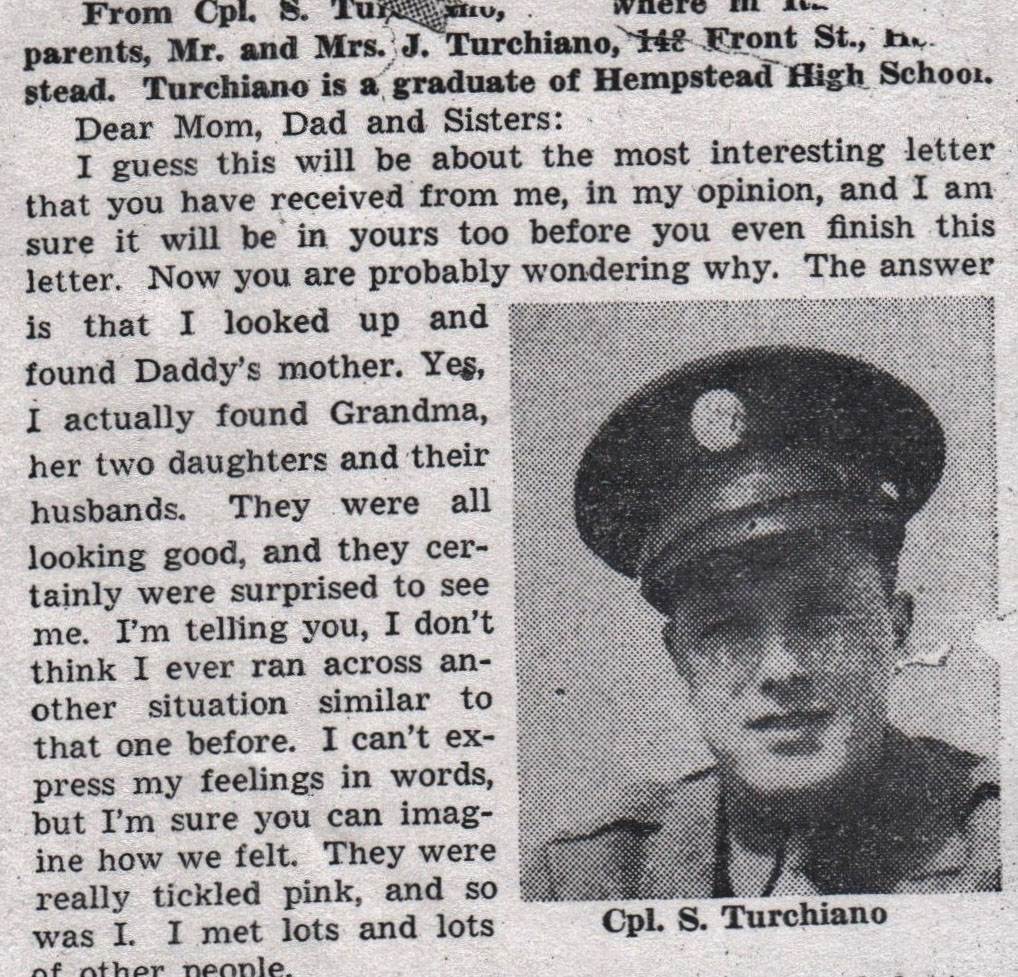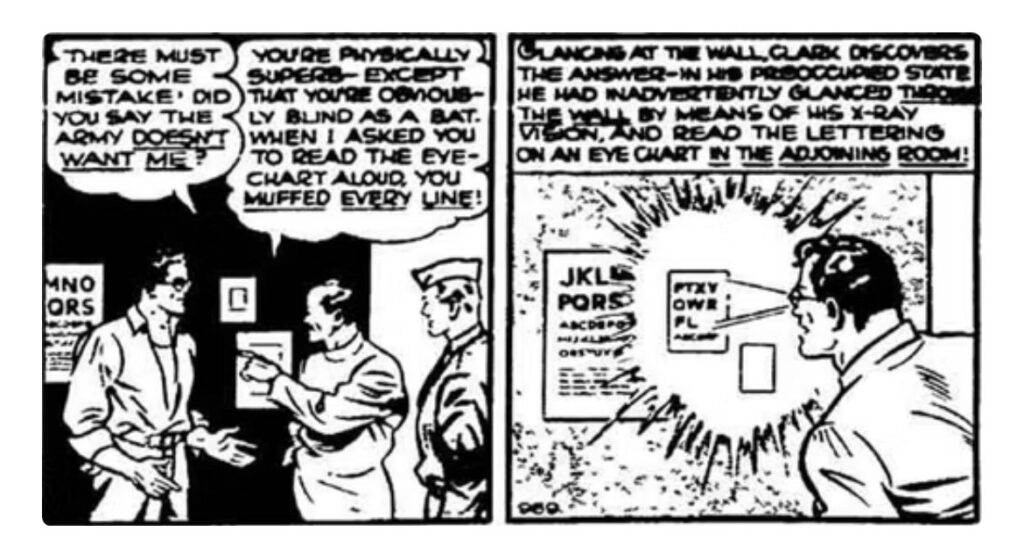By Bruce Bouchard and John Turchiano
Editor’s note: Bruce Bouchard is former executive director of The Paramount Theatre. John Turchiano, his friend for 52 years, was formerly the editor of Hotel Voice, a weekly newspaper on the New York Hotel Trades Council. They are co-authoring this column to tell short stories on a wide range of topics. In this week’s column Turchiano tells a story about the war.
This week marks the 79th anniversary of V-J Day, Sept. 2, 1945, marking the official end of World War II.
During the golden age of comic books two super heroes failed their U.S. Army physicals. One of them was Clark Kent. Yes, Superman’s publisher had to come up with an idea to keep him out of the military during World War II. Otherwise, readers would expect the U.S. to win the conflict in a few days. The solution was brilliant. And if you think I’m making this up, I assure you I could never be this creative: Clark Kent indeed tried to enlist in the U.S. Army. But during his eye exam he inadvertently read a chart in the neighboring room with his x-ray vision. “You’re physically superb,” the doctor told him, “except you’re obviously blind as a bat.”
The other super hero who failed his army physical was my father, Serafino Turchiano. Dad tried to enlist but when he was 12 years old a friend had accidentally shot him in the eye with a BB gun. Although they were able to save his eyeball he lost almost all the vision in that eye, a condition that was easily discovered during his army physical. But then the answer to a simple question became his key to entry into the military. Could he speak Italian? He could, and as this would be an asset in the sure-to-come military campaign in Italy. So he was accepted into the U.S. Army.
After training, my father, now a corporal, was assigned to the Army Air Force on a B-24, the U.S. bomber known as the “Flying Boxcar.” He and his crewmates bonded and remained friends after the war. One of those crewmates told me, “Your father was some mechanic. He could fix anything on the ground or in flight.” That crewmate was Sergeant Stefano Corso, who in 1948 served as best man at my parents’ wedding and was always known to the Turchiano kids as Uncle Steve.
In 1943, my father’s bomber began flying missions designed to damage Nazi fortifications in Italy. Dad never spoke about this. But Uncle Steve Corso did. He told me the bomber they flew often had to dodge German fighter planes and was frequently the target of flak (anti-aircraft fire). After the liberation of Rome on June 4, 1944, my father’s entire crew was granted a short leave. Upon hearing the news, Dad impulsively decided to hitchhike across Allied-occupied Southern Italy and visit Bitetto, a very small village on the opposite coast, 240 miles from Rome. There, he hoped to visit with some people he had never met, his paternal grandmother and some aunts and uncles. There was no way to telephone or telegraph his relatives, and he didn’t even have an address. Still, he packed a knapsack with a map, a canteen and some K-rations, and off he went.
Being in uniform as he hitchhiked across Southern Italy, my father had no difficulty catching rides with jeep-jaunting GIs, as well as British troops quite willing to give lifts to a Yank ally. It took 14 hours, but Dad found himself in Bitetto late on June 9, 1944. Of course, he had no idea how to find the house where his grandmother lived. But he saw a young boy and asked him in Italian if he knew where Anna Turchiano lived. The boy nodded and asked, “Hai del cioccolato?” Do you have chocolate?
Fortunately, the Army Air Force’s K-rations contained Hershey bars and Dad handed one to the boy.
“The way that kid’s eyes lit up you would have thought it was a gold bar not a candy bar,” my father told me many years later. Bitetto was a very small village back then and it took the boy only a few minutes to take my father to a house that was clearly showing its age. Dad could only hope this really was the home of his grandmother.
He knocked on the door. It was opened by two elderly women. “Chi sei?” one of them demanded. Who are you? “Questo è mio nipote,” the other woman said, as tears welled in her eyes and she put her arms around my father, kissing him repeatedly. “This is my grandchild.”
Maybe it was a photo sent from New York sometime or a family instinct or resemblance that had told her immediately that this American soldier was her first grandchild, one of six born in the U.S. that she had never seen.
This surprise visit was big news in Bitetto. My father, who wasn’t even certain he’d find his relatives, was warmly welcomed by virtually the entire village. He met his aunts and uncles and some cousins. People packed the home of Anna Turchiano to hear of any news from “L’America.”

Cpl. Turchiano’s letter to his family was published in the Long Island Press in August 1944. The letter recounted Turchiano’s surprise wartime visit to his grandmother in Bitetto, Italy.
Dad was asked, “Do you know so and so in Pennsylvania?” “How about this person in California? Do you know him?” My father later wrote a letter to his family that said, “The people here have no idea about the vast size of America, but it seems everyone in Bitetto has family in Brooklyn.”
Since it was not strategically important, Bitetto was left undamaged by the war, but its severe poverty was clearly evident to my father. Nevertheless, enough semolina flour was scraped together to make pasta for a celebratory feast. All the while people kept streaming into the house seeking information about L’America. Even the Mayor of Bitetto came. They all spoke to Corporal Serafino Turchiano as if he were General Eisenhower. Could he tell them if the war was going to end soon?
My dad stayed overnight and into the next afternoon, and then hitchhiked back to Rome. But he relished telling the story for the rest of his life, even into his 90s. He held it as strong evidence of the significance of family. His brief visit to Bitetto during World War II told him his father had left the poverty of his hometown for America at age 19 because he wanted a better life for himself and any children he might have, kids like my father. But dad also realized that the poverty-stricken people he met in Bitetto, some of whom were illiterate, had worked hard and had scrimped and saved to send children to America. Indeed, cross Atlantic boat trips, even in loud, reeking, teeming steerage, cost dearly back then. Realizing that many of the people he met in Bitetto had sacrificed so much to send children to America for a better life meant a great deal to dad.
I don’t think my father read Luigi Barzini’s 1964 best seller “The Italians.” But in it Barzini wrote this about the Italian people: “Humble parents do without comforts in order to see that their children go to school and reach a higher rung in the social ladder. The climbing is not hurried; it is done in successive waves, one generation after the other, till the highest pinnacles are reached.”

Yes, Clark Kent failed his U.S. Army physical when his x-ray vision inadvertently read the eye chart in the adjoining room.
On a short military leave in 1944, my father was witness to the truth in Luigi Barzini’s words. Barzini was generalizing, of course, but he was certainly writing about the Turchiano family, among so many others. And if you think about it, his writing applies to many of the immigrants who struggle to come to the U.S. today, humble parents sacrificing so much in the hope of seeing that their children can go to school and reach a higher rung on the social ladder. I’m proud that we’re a country that can allow that to happen. It’s one of the things men like my father, my Uncle Steve Corso and so many other Americans risked their lives fighting for in World War II.




